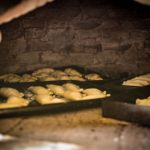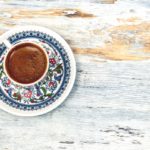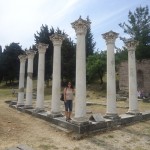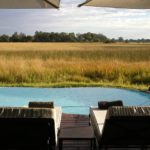Unearthing Food: In Conversation with Food Writer Robyn Eckhardt
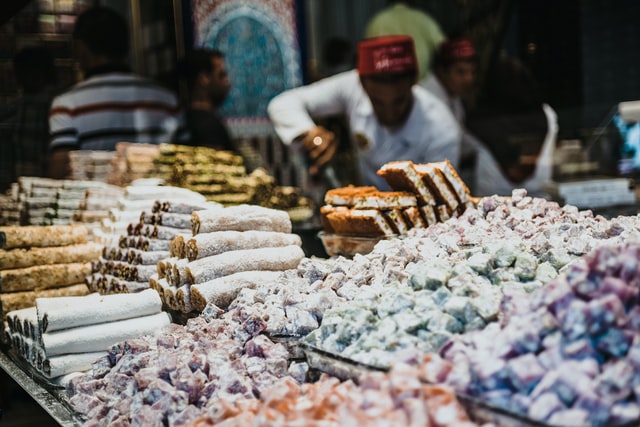
Creating an appealing, readable cook book takes so much more than just listing recipes. We had a chat with food writer Robyn Eckhardt about her experiences balancing cooking, travelling, and blogging in Turkey, China, and Thailand, and how she turned these into a cook book.
Unearthing Food: In Conversation with Food Writer Robyn Eckhardt
Traveling, cooking, and writing! How do you balance it all?
Until I began work on my cookbook, I wrote primarily travel articles that didn’t include recipes — cooking was just for myself and my husband (I’ve always viewed cooking as a way to relax and recharge). So my schedule was something like travel for a month, do a bunch of reporting for a bunch of different stories, and then go home for a month and write. ‘Leftovers’ — reporting I did beyond what was commissioned, or stories that I couldn’t sell, went on my blog.
Once I started work on my book, part of the writing time became recipe development/testing time. Over about four years I made 16 or so trips to Turkey, ranging in length from three to eight weeks. So I’d do my ‘reporting’ and research, then go home for a couple of months and write and cook.
Which destinations have inspired you to write and cook most, and why?
Pretty much everywhere I’ve lived or travelled has inspired me to cook, often because when I go home I can’t eat the things I loved from the place I visited unless I make them!
I lived in Sichuan, China for a year after university, then returned to my home state of Michigan for a year. It was the mid-80s, and believe me there were no restaurants serving good Sichuan food. So I bought a Sichuan cookbook and taught myself. I did the same after my first trip to Thailand. I lived for 20 years in Asia, and almost never cooked the food of the places I lived… until I left.
Desperation for flavours I crave drives me to the stove. Now that I live in Italy I cook a lot of Mediterranean Italian-style dishes… but I still cook Turkish food, Sichuan food, Thai food, etc on a regular basis.
Tell us specifically about your cookbook, Istanbul and Beyond: Exploring the Diverse Cuisines of Turkey?
The inspiration for the book came during a trip to Turkey’s Black Sea coast in 2010. By then I’d already travelled maybe a total of four or five months in Turkey over the years (I first visited Turkey in 1998, and that visit prompted me to study Turkish at UC Berkeley). But Black Sea cuisine is unique, and I found myself eating ‘Turkish’ foods I’d never heard of before.
I decided to write a cookbook focusing on regional cuisines in Istanbul, and eastern Turkey — the provinces that most people don’t visit, the provinces whose food we rarely hear about. In the book I also aim to show how closely aligned what people eat in eastern Turkey is with where they live. From the land comes the food, so to speak. People living in eastern Turkey are locavores, and cook to the seasons, to an extent that most Americans, and probably people in other parts of the world, can hardly imagine — not because it’s trendy or hip, but just because that’s the way it’s always been.
I’m happy to say that I’ve heard from citizens of Turkey who were not familiar with many dishes I included in the book. I include dishes I learned in home and restaurant kitchens, in fishing boat galleys, from women at markets, in traditional bread bakeries, etc. Everyday food — home-style if not home-cooked.
Are there specific Turkish chefs who have inspired you or restaurants you ate at whose recipes you wanted to emulate?
No matter where in the world I am, I tend to favour casual, local-style places to eat over upscale restaurants. The cooks who inspired my book can be said to fly under the radar. They are housewives, villagers, workers in traditional wood-fired bread bakeries, vendors at farmers’ markets, butchers… I always enjoy eating at Nicole Restaurant when I’m in Istanbul, because chef Aylin Yazicioglu — Turkish, Europe-trained, Istanbul native — does wonderful things with Turkish ingredients. But that is not the food I cook at home, and it’s not usually the sort of food I write about.
What is your personal favorite recipe in your book?
Ah, the dreaded ‘favourite recipe’ question! Everyone asks it and I don’t have a pat answer yet! It really depends on the season, if it’s snowing or 30C and sunny… so I’ll give one fave dish for each season.
Summer: Bulgur Filled Peppers and Zucchini in Tomato and Pomegranate Molasses Sauce from Chapter 6 — a great use for larger zucchini and in-season red peppers!
Fall: White Bean and Tomato Stew from Chapter 1 — comfort food for increasingly cold weather.
Winter: Meatballs with Pumpkin and Spice Butter from Chapter 4 — fabulous casual dinner party fare.
Spring: Corn Meal Pie with Leeks and Greens from Chapter 2.
Unearthing Food: In Conversation with Food Writer Robyn Eckhardt.
How did you integrate cultural and travel aspects of Istanbul into your cookbook?
I approached the book as a journalist. My research involved as much reporting, interviewing, etc. as it did recipe research. So while there are over 125 recipes, there’s lots of cultural information in headnotes, some stories about people I met, and essays about landscapes, agriculture, artisan food producers etc at the beginning of, and sprinkled through, the chapters.
I am personally not enamoured of cookbooks that are nothing but recipes. Before I was a cookbook author I was a journalist who told stories about food and the people who grow, make, and cook it. And I wanted that element to be in the cookbook.
I should also shout out the book’s photographer David Hagerman, who is a photojournalist and approached the project that way. His location shots really add depth and context. I wanted to place the reader in these places, many of which are unfamiliar even to those who know Turkey, and I think the combo of words and photos does just that!



